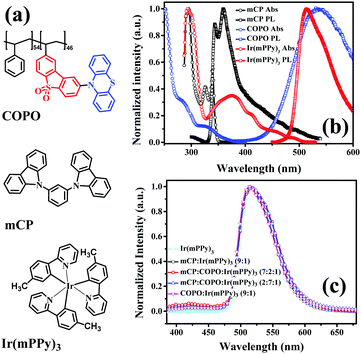
Efficient triplet utilization in conventional solution-processed phosphorescent organic light emitting diodes using a thermal activated delayed fluorescence polymer as an assistant host
Dianming Sun, Zhongjie Ren and Shouke Yan
Abstract: Solution processed Ir(mPPy)3 based phosphorescent organic light emitting diodes (PhOLEDs) were fabricated, in which mCP and a TADF copolymer, COPO, were selected as host and assistant host components, respectively. The COPO has a lower triplet energy and a higher singlet energy than Ir(mPPy)3. Compared with traditional Ir(mPPy)3 doped mCP type PhOLEDs, the introduction of COPO as an assistant host can effectively improve the electroluminescent performance. Utilizing 20% COPO and 70% mCP (w/w) as a mixed-host system for Ir(mPPy)3 in solution-processed devices, a considerably higher current efficiency of 56.8 cd A−1 has been achieved with great improvement, compared to traditional Ir(mPPy)3 based devices with mCP as the single host (24.5 cd A−1). Moreover, the EQE displays only a slight roll-off from an EQEmax of 17.3% to an EQE of 16.0% at 500 cd m−2. The improved PhOLED performance is mainly attributed to the full utilization of triplet excitons as COPO may facilitate the triplet transfer due to a closer physical contact with mCP and Ir(mppy)3 molecules. Moreover, the presence of COPO also improves the ambipolar transport of charge carriers.
